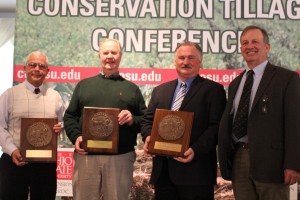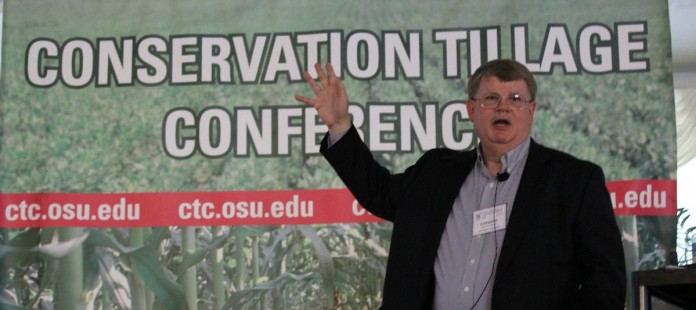ADA, Ohio — As farmers prepare to plant the upcoming crop, there’s not much they can do about the falling markets and the low prices they will likely face.
But, they can do themselves a big favor by questioning their input costs, and cutting from their program anything that isn’t essential.
About 1,000 farmers gathered for the Conservation Tillage Conference March 3-4 in the western Ohio town of Ada, where they were told not to “drink the Kool-Aid” of salesmen who want to sell farmers things they really don’t need.
“Farmers don’t need every crop input … that the industry wants to try to sell them,” said Bob Nielsen, extension corn specialist at Purdue University.
He said there’s only a limited number of farmers — and a decreasing number — for seed and crop salesmen to attract, retain or steal from other salesmen — and that farmers need to be critical of everything offered to them.
“The challenge for growers it to separate the wheat from the chaff … and to figure out what is credible information,” he said.
There are many ways to determine how “credible” the information is. When it comes to seed variety, Nielsen said producers need to think about where the research was conducted, was it similar to the conditions in the farmer’s field, how many years or trials were conducted, and what kind of statistical analysis was conducted.
He said a simple comparison that one field yielded better than the other is not enough. And, he warned that even when researchers and farmers think a particular result is from a particular treatment, there’s always some background factor that could be getting in the way.
“There’s a lot of background noise that also influences the thing we’re trying to measure,” he said. “It’s this background noise that can cover up or camouflage or mask the effects of the treatments we’re so interested in.”
That’s why repeating and replicating the experiment is so important, to get as many results and as much data as possible.
Essential inputs
While questioning your inputs is smart business — no one at the conference discounted the fact that some inputs are essential — and should not be abandoned.
Curtis Young, OSU Extension educator from Van Wert County, led a talk on the pros and cons of dropping traited hybrids in favor of conventional hybrids.
“In the long run, it might not save us as much as we think it would,” he said.
He reminded producers that the reason they got into traited hybrids was usually for protection against yield-reducing disease and weed issues, insect damage, and so that the crop would be resistant to herbicides, such as RoundUp.
To neglect these traits could cause an untimely, and costly return of the very issues they’ve been preventing.
However, he said farmers shouldn’t assume that if they didn’t have a particular problem, it must have been because of the traits they planted.
“There may not have been a problem in the first place and you were paying for protection that may not have been necessary in the first place,” he said.
He told producers to think critically about each field and to consider all of the consequences of each decision.
He also warned producers from becoming over reliant on certain traits — like herbicide resistance — because eventually the soil and weeds adapt and overcome the resistance — and then you have herbicide resistant weeds.
“We have to be cognizant of what we’re doing when we use these hybrids — not just automatic,” he said.
Emerson Nafziger, extension specialist with the University of Illinois, said farmers need to think in terms of the things that are limiting yields — and if they want higher yields — fix those specific things. They need to make sure what they’re “fixing” actually needs fixed and is worth the investment.
“Whenever we’re being offered something to fix something, I’d pay a lot of attention to the verbiage in that,” he said. “Why would I expect to see a response to fixing a problem that I don’t have?”
He encouraged producers to get multiple sources of information before selecting corn hybrids — and not to rely on university research alone.
Master farmers
At the start of the conference, ag journalist Tim White presented Master Farmer awards to Terry McClure, of Paulding County; Fred Yoder, of Union County; and Keith Kemp of Preble County.

All three farm with their families and have been actively involved with local, state and national farm organizations throughout their career.
“They’ve done a great deal to spread the word of agriculture,” White said. “They’ve represented our state well and they’ve represented our nation well by the time and the amount of work that they’ve done.”
McClure, a fifth-generation farmer who also raises hogs for Cooper Farms, has been an outspoken advocate for water quality improvement and practices farmers can take to help reduce phosphorus runoff.
“I’ve never been prouder of Ohio ag as we go to work on (this) issue,” he said.
Yoder, a fourth-generation farmer, said has served on state and national corn boards and is promoting “economical” solutions to the water quality issue.
“There are people out there who would like to change the way we farm and I’m just trying to bring a common sense approach,” he said. “Economics are going to be a big part of whatever we do. It’s got to pay for itself.”
Water quality and new methods of nutrient application were the focus of the second day of the conference, which Farm and Dairy was unable to attend.
Related coverage:
Some wild cards for 2015 grain markets
STAY INFORMED. SIGN UP!
Up-to-date agriculture news in your inbox!










